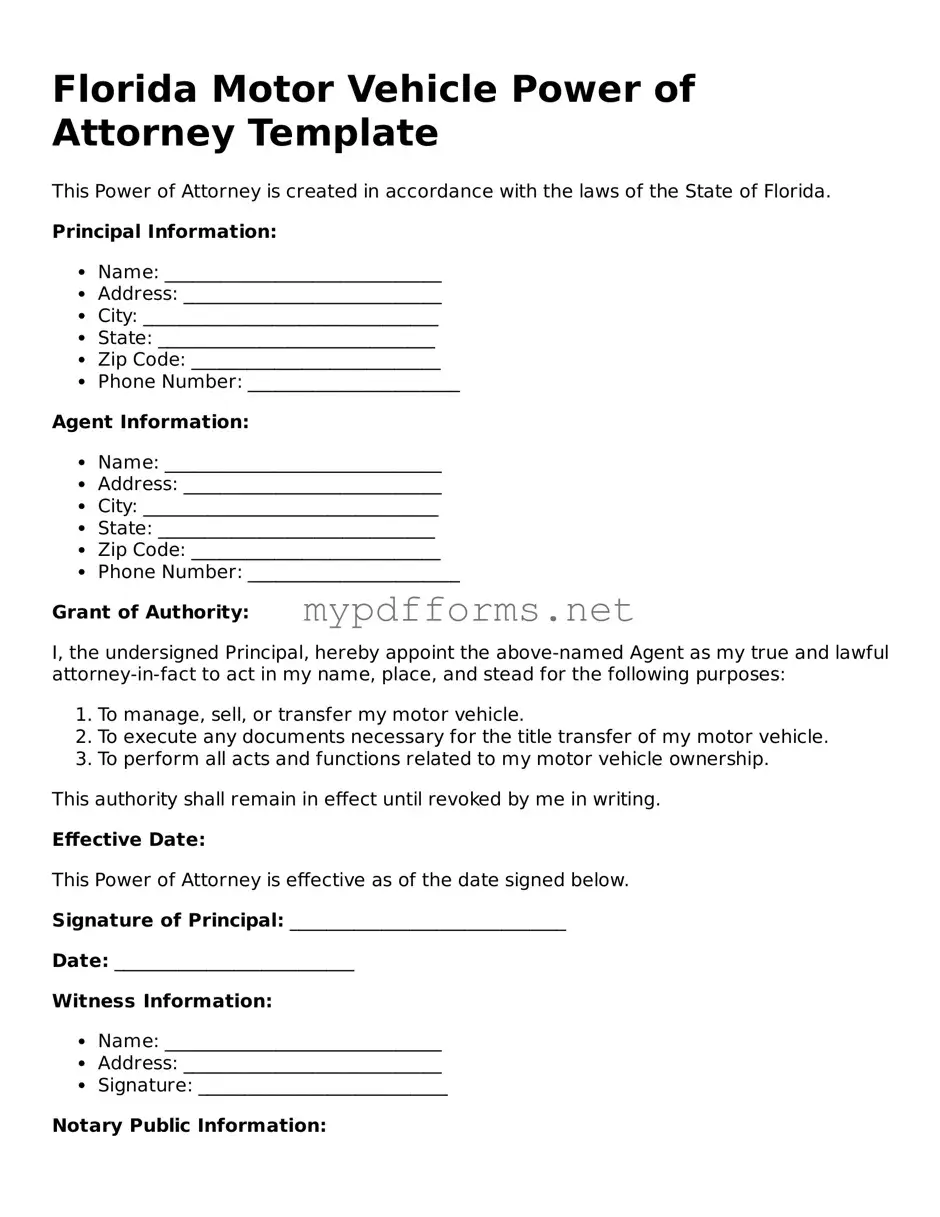The Florida Motor Vehicle Power of Attorney form is similar to the General Power of Attorney. Both documents allow an individual, known as the principal, to designate another person, called the agent, to act on their behalf. While the General Power of Attorney can cover a wide range of financial and legal matters, the Motor Vehicle Power of Attorney is specifically tailored for transactions involving motor vehicles. This specialized focus ensures that the agent can handle tasks such as title transfers, registrations, and other vehicle-related duties without needing to obtain a broader power of attorney.
Another similar document is the Durable Power of Attorney. This form also allows a principal to grant authority to an agent, but it remains effective even if the principal becomes incapacitated. Like the Motor Vehicle Power of Attorney, the Durable Power of Attorney can be limited to specific tasks. However, it provides a broader scope in terms of financial decisions, whereas the Motor Vehicle Power of Attorney is limited to vehicle-related matters. This distinction is crucial for individuals who want to ensure their vehicle affairs are managed separately from other financial responsibilities.
The Limited Power of Attorney shares similarities with the Motor Vehicle Power of Attorney in that it grants specific powers to an agent for a defined purpose. This document is often used for particular transactions or time periods. For example, a principal might use a Limited Power of Attorney to allow an agent to sell a vehicle while they are away. The specificity of both forms ensures that the agent's authority is clear and confined to the tasks outlined in the document, reducing the risk of misuse.
The Vehicle Title Transfer form is another document that resembles the Motor Vehicle Power of Attorney. Both are used in the process of transferring ownership of a vehicle. However, the Vehicle Title Transfer form is primarily a document that records the change of ownership, while the Motor Vehicle Power of Attorney empowers an agent to execute that transfer on behalf of the owner. The Motor Vehicle Power of Attorney can facilitate the completion of the Vehicle Title Transfer by allowing the designated agent to sign the necessary documents.
Just as there are various forms of Power of Attorney, those seeking to formalize their decisions in Illinois can benefit from a specific document tailored to their needs. For more detailed guidance on completing the required paperwork, individuals can refer to Illinois Forms, ensuring they select the appropriate form that best suits their situation and grant authority effectively.
The Bill of Sale is also comparable to the Motor Vehicle Power of Attorney in that it is often used in the sale of a vehicle. A Bill of Sale serves as a receipt and proof of the transaction between the buyer and seller. While the Motor Vehicle Power of Attorney allows an agent to execute the sale on behalf of the owner, the Bill of Sale documents the terms of that sale. Both documents are essential in ensuring that the transaction is legally recognized and that the rights of both parties are protected.
The Consent to Transfer form can be likened to the Motor Vehicle Power of Attorney as it is often used when ownership of a vehicle is being transferred. This document typically requires the consent of the current owner to allow the transfer to proceed. In contrast, the Motor Vehicle Power of Attorney enables an agent to act on behalf of the owner, streamlining the process without needing to gather consent for each transaction. Both documents work together to facilitate the legal transfer of vehicle ownership.
The Affidavit of Heirship is another document that bears similarity to the Motor Vehicle Power of Attorney. In situations where a vehicle owner has passed away, this affidavit can help establish the rightful heir's claim to the vehicle. While the Motor Vehicle Power of Attorney cannot be used posthumously, it is important to understand how these documents interact. The affidavit can serve as a means for heirs to assert their rights, while the Motor Vehicle Power of Attorney is useful for managing a vehicle's affairs while the owner is still alive.
Finally, the Release of Liability form is similar to the Motor Vehicle Power of Attorney in that it addresses the legal responsibilities associated with vehicle ownership. When a vehicle is sold or transferred, the Release of Liability form notifies the Department of Motor Vehicles that the seller is no longer responsible for the vehicle. While the Motor Vehicle Power of Attorney allows an agent to handle the transfer process, the Release of Liability protects the seller from future liabilities related to the vehicle. Both documents are essential in ensuring a smooth transition of ownership and responsibilities.

